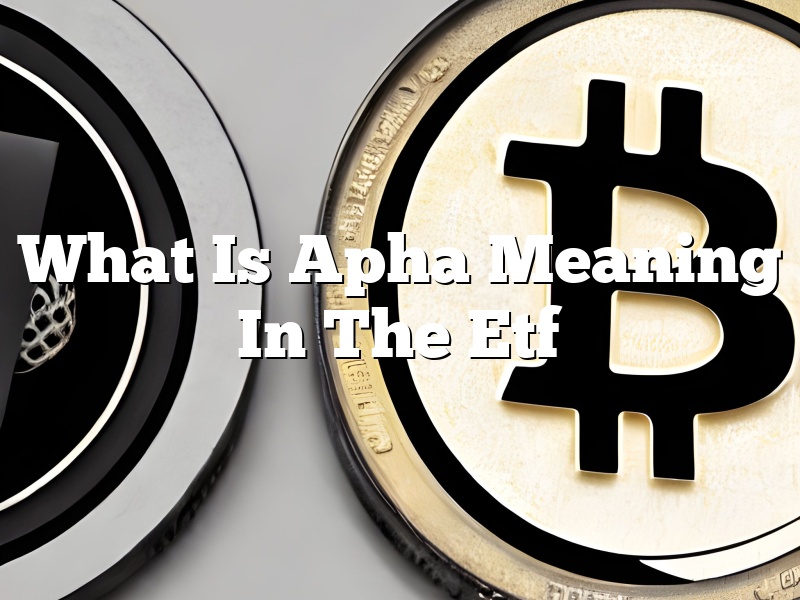What Is Apha Meaning In The Etf
Alpha is a measure of a stock’s price movement in relation to the rest of the market. If a stock has an alpha of 1, it means that it has outperformed the market by 1%. If a stock has an alpha of -1, it means that it has underperformed the market by 1%.alpha is also a measure of risk, with a higher alpha indicating more risk.
There are a few different ways to calculate alpha. One common way is to use a regression analysis to compare a stock’s returns to the returns of a benchmark index.
Contents
What is a good alpha score for a fund?
Alpha is a measure of a fund’s performance relative to a specific benchmark. A high alpha score means that the fund has outperformed its benchmark, while a low alpha score means the fund has underperformed. A good alpha score for a fund depends on the benchmark used.
For example, if a fund’s benchmark is the S&P 500 Index, an alpha score of 2.0 would indicate that the fund has outperformed the index by 2.0%. If the benchmark is the Barclays U.S. Aggregate Bond Index, an alpha score of 2.0 would indicate that the fund has outperformed the index by 2.0%.
There is no definitive answer to the question of what is a good alpha score for a fund. It depends on the benchmark used and the investment objectives of the fund.
What does portfolio alpha tell you?
In finance, portfolio alpha is a measure of the performance of a portfolio, relative to a benchmark, such as the S&P 500 Index. Alpha is used to calculate the risk-adjusted return of a portfolio.
There are a few different ways to calculate portfolio alpha. One way is to subtract the benchmark’s return from the portfolio’s return. This will give you the excess return of the portfolio. Then, you can divide this by the volatility of the portfolio to get the Sharpe ratio. The Sharpe ratio is a measure of how much return you are earning per unit of risk.
Another way to calculate portfolio alpha is to use the Jensen’s alpha. Jensen’s alpha is a measure of how much the portfolio outperforms the benchmark, after accounting for the risk of the portfolio.
Both of these measures are used to determine the risk-adjusted return of a portfolio. The higher the alpha, the better the portfolio is performing, relative to the benchmark.
There are a few things that you should keep in mind when interpreting portfolio alpha. First, alpha is relative to a benchmark. So, a portfolio with a high alpha may not be outperforming the market overall. It may only be outperforming a specific benchmark.
Second, alpha can be negative. This means that the portfolio is performing worse than the benchmark.
Finally, alpha is not a perfect measure of performance. It does not take into account all of the risks of a portfolio.
What is alpha and beta in ETF?
An exchange-traded fund (ETF) is a security that tracks an index, a commodity, or a basket of assets like an index fund, but trades like a stock on an exchange.
There are two types of risk that are associated with an ETF:
1. Systematic risk: This is the risk that is inherent in the market as a whole and can’t be eliminated by diversification.
2. Unsystematic risk: This is risk that is specific to a security or a particular issuer and can be reduced through diversification.
Alpha is a measure of an ETF’s risk-adjusted performance. It is calculated by subtracting the ETF’s excess return (the return that is beyond what can be explained by the risk factors) from the risk-free rate of return.
Beta is a measure of how much the price of an ETF moves in relation to the price of the index it tracks. A beta of 1 means that the ETF moves in lockstep with the index. A beta of less than 1 means that the ETF moves less than the index, and a beta of more than 1 means that the ETF moves more than the index.
What does alpha of a fund mean?
Alpha is a measure of a fund’s or individual security’s performance on a risk-adjusted basis. It is calculated by subtracting the risk-free rate from the fund’s or security’s return, and then dividing by the standard deviation of the fund or security’s return.
Is a high or low alpha better?
A high alpha wave is better for productivity and creativity, while a low alpha wave is better for relaxation.
Is higher alpha good or bad?
Alpha waves are brainwaves that are associated with a state of relaxation. Alpha waves are also associated with creativity and focus. Some people believe that alpha waves are a good thing and that more alpha waves are better. Other people believe that too much alpha can be a bad thing.
There is no definitive answer to the question of whether higher alpha is good or bad. Some people believe that too much alpha can lead to a lack of focus and creativity. Others believe that alpha waves can help to improve focus and creativity. More research is needed to determine the effects of alpha waves on the brain.
What does an alpha of 1.5 mean?
An alpha of 15 means that the security is estimated to drop by 1.5% in the next month.
An alpha of 15 is a measure of a security’s expected future volatility. It is calculated by taking the historical standard deviation of the security’s returns and dividing it by the historical average return.
A high alpha value indicates that the security is expected to be more volatile in the future, while a low alpha value indicates that the security is expected to be less volatile.






0